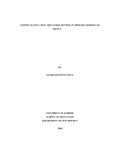| dc.description.abstract | The hallmark of testing in inclusive setting is the support of the learners with special
needs in the mainstream classrooms. The provision of appropriate testing in regular
schools is faced by rampant challenges. The purpose of this study was to determine
adequacy of assessment practice in inclusive education situations in Kenya. The
objectives that guided this study are, to investigate knowledge and skills of testing in
inclusive setting, physical and structure of testing in inclusive setting, school approach in
testing in inclusive setting, behaviour of teachers and learners on testing in inclusive
setting and national policy for inclusivity on testing in inclusive setting.
In this study the researcher used mixed analysis where both quantitative and qualitative
techniques were used within the same frame work. The study involved a population of
forty respondents from eight public primary schools in Thika East Sub County in
Murang’a County. The sample was selected through purposeful sampling technique
where the sample was based on the knowledge and experience of the respondents. The
researcher also used the descriptive approach to turn the data on the questionnaires into
numbers according to 5 point Likert scale. The data was then analyzed using the SPSS
version 21 and presented on tables and graphs for easy interpretation.
From the outcome of this study, testing practice in inclusive education setting seem to
be faced by rampant challenges related to knowledge and skills, physical and structure,
school approach, behavior of teachers and learners as well as national agenda for
inclusivity in Kenya. This concurs with findings of Chhabra et al (2010) on inclusive
education in Botswna. He contends that testing is faced by challenges such as lack of
trained personnel, learning resources, educational facilities and testing policies of testing
in inclusive setting. The implication of results of this study is that there is indeed
inadequate assessment practice in inclusive education settings. There is need to equip
teachers with knowledge and skills in testing in inclusive education, appropriate
educational resources, proper school approaches, appropriate testing policy. There is also
need to encourage teachers and learners behaviour that support learners with special
needs in inclusive setting | en_US |

